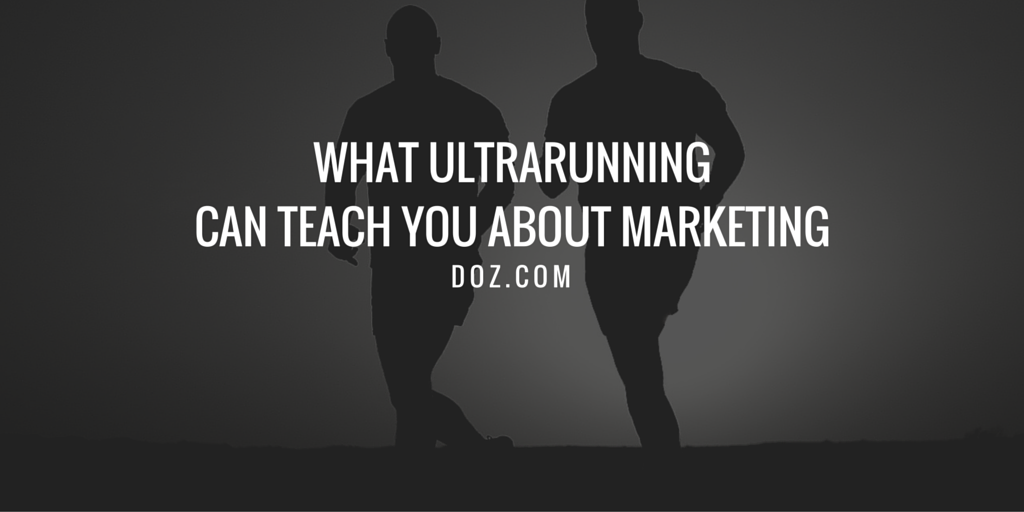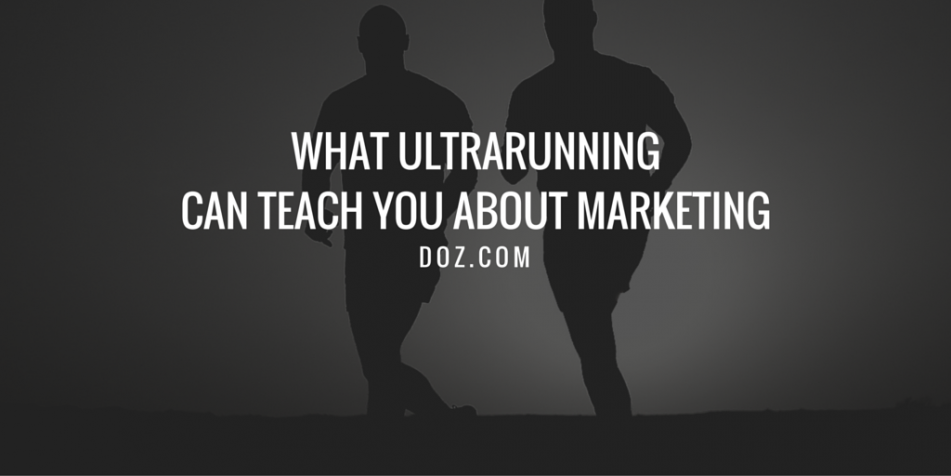
Everyone here on the team at DOZ has hobbies and interests outside of work.
Some like to play soccer, others prefer to support soccer teams (all that running around can be a pain, right?), some are photographers, some ride motorcycles, and some DJ in their spare time. We’ve got free climbers and dog lovers and world travelers, and then there’s me.
I like to run.
Running helps me get started in the morning and it helps me de-stress at the end of the day. I like to squeeze in a run at lunch sometimes, and I like hitting the trails only a few minutes from the DOZ office to get back into nature and breath in some fresh air. Sometimes I race and, when I do, I race long distances, ultramarathon distances.
So I’m a runner and an ultrarunner.
Ultrarunning is incredibly good fun. It’s really the ultimate combination of physical and mental effort. To do well you need to train your body to run for a long time and you need to train your mind not to give up. Four hours into a six-hour run is usually a time when my body is crying out to quit but my mind is telling me to keep going? Yeah, that’s what makes this sport a challenge.
While running all day or all night might not seem to have a lot to do with marketing, I’ve come to believe that there are some ways in which my ultrarunning hobby crosses over with my day job. In this post I’ll explain what I think ultrarunning can teach you about marketing.
Preparation is Essential
I’ve learnt through painful experience that not preparing for a long run can lead to some not so good outcomes. I’ve learnt over time that there are certain things I need to do to dial in my running, to prepare my legs for the effort, and to be prepared when I get to the start line on race day.
The same applies to marketing efforts. Before launching into a marketing event you need to spend the time to lay out a strategy, set goals, marshal resources, and allocate roles. There’s really no such thing as a marketing campaign that emerges on the fly, or at least there aren’t examples of successful campaigns born that way. Laying the groundwork for a marketing campaign means going into the campaign with eyes open and ready to succeed and avoiding that stomach-turning feeling that you aren’t quite ready for the future about to arrive.
Know What You Need
For a run around the block I don’t need anything other than time and maybe some good music on my iPod. For longer runs and ultra races, though, I need to think ahead and make sure I have the food, water, and supplies I need to make it through comfortably.
It’s much the same when it comes to a marketing campaign. Before setting out you need to know what tools and resources you need to make it through. How will you track your efforts? What will you measure? How will you post updates and blog posts? What Content Management System is going to work best for your project? And do you have the financial and human resources to see the project through to the end? This knowledge does come with time, of course, but getting prepared in advance of heading out is a must for any marketer.
Pace Yourself
How do you run for hours at a time? Pacing. Go out too fast and you’ll enjoy the first few miles before having a terrible time in the last half of a race. Take it steady, keep a pace you know you can maintain for a long time, and you’ll enjoy your ultramarathon far more.
The same applies for a marketing campaign. Sure, you have big goals and you want to hit them all fast but moving too fast often means making errors. Don’t be the marketer that takes off out of the gates, expends all their resources early, and then realizes that there is little left in the tank to follow up. If you work to your marketing strategy and use it as a guide for the steps and tasks in your campaign, you’ll still hit your goals but you’ll do so without burning out.
Be Prepared for Things to Go Wrong
There’s a lot that can go wrong in an ultramarathon. A wrong step here, forgetting to hydrate there, a wrong turn on the trail – almost anything is possible when your race is measured in hours instead of minutes. What’s important is to recognize what could go wrong and prepare for something to go wrong, because it will.
Now think of a marketing campaign. There is plenty that can go wrong and it’s almost certain that something will go wrong if not in this campaign then in a future campaign. Whether it’s a technology crash, a joke on social media that doesn’t hit the mark, marketing materials you ordered that didn’t show up as promised, or a team member who is integral to your plans but who gets a job offer – and leaves – before they can finish the job. Simply put, recognizing that things can and will go wrong and then planning to deal with these possibilities means you’ll be better prepared for the issues that inevitably pop up.
Recover and Assess When Its Over
The pride and smiles that come with finishing an ultramarathon are a special part of the experience of running an ultramarathon. It’s a great feeling to cross the finish line and, believe me, it’s worth celebrating when you do. However, when the finishing high dissipates, it’s time to assess what worked, what didn’t, and get prepared for the next race.
The same works in a marketing campaign. After everything is done, the campaign complete, and the results are in it is time to analyze. Did your social marketing efforts pay off in the way that you hoped they would? Was your click through rate (CTR) what you hoped for? And if not, can you account for why it didn’t hit the heights you were aiming for? What can be learnt from this campaign and applied in the next campaign? What areas need to be improved, what strategies need to be dropped, and what can be tweaked and tested in the future? While the planning before a campaign is important, so is the post-campaign analysis and assessment. The more honest and far-reaching it is, the better.
Conclusion
Running in the hills for hours at a time might not, on first glance, seem to align much with a digital marketing campaign. Yet there are clear parallels between the experience and sport of ultrarunning and deploying a successful digital marketing campaign.



7 Comments
After study a few of the blog posts on your 메이저사이트website now, and I truly like your way of blogging.
Sutter Health
You have noted very interesting details! ps decent web site.
This was beautiful Admin. Thank you for your reflections.
Good post! We will be linking to this particularly great post on our site. Keep up the great writing
I very delighted to find this internet site on bing just what I was searching for as well saved to fav
Thanks for sharing. I read many of your blog posts, cool, your blog is very good. https://www.binance.com/kz/join?ref=DB40ITMB